How to Make Money as an Airbnb Host (Beginner’s Guide)
Renting out space in your home can be a fun and lucrative gig. Hosting can help you pay off debt, save for that awesome vacation you've always wanted, or even provide a full-time income. Learn how to be an Airbnb host here.
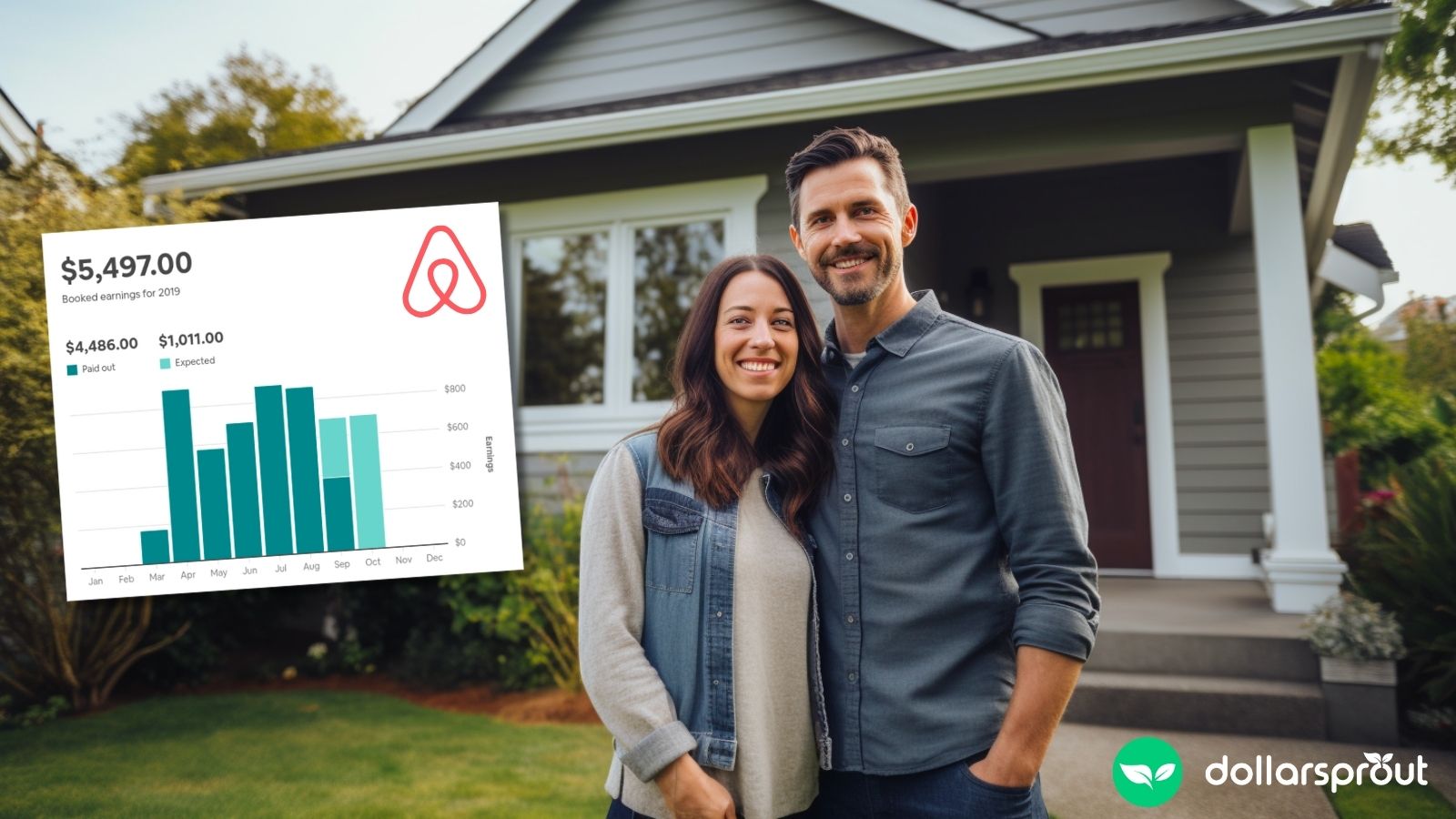
Perhaps you saw a headline on the news that had some eye popping numbers (like CNBC’s recent feature on one man who made $360,000 in 4 years as an Airbnb host).[1]
Or maybe it was the painful conversation you had to sit through as your friend bragged about how they made $600 from their Airbnb this past weekend.
In either case, your curiosity is peeked and you can’t help but wonder, could you too make money as an Airbnb host?
Well, as luck would have it, the vast majority of you can.
Be it listing a single bedroom in your home, or putting the whole house up for grabs while you’re out of town, the short-term rental market has quickly become an affordable alternative to more traditional lodging choices (like costly hotels).
A relatively passive earnings opportunity, Airbnb provides a platform for you to make money from unused living spaces.
Money that can help you pay off debt, go toward a vacation, or even replace your current full-time income.
Whatever your reason for wanting to get started, our comprehensive Airbnb hosting guide will introduce you to the necessary rules and requirements for listing with Airbnb, and lays out helpful tips for maximizing your earnings.
Things to Consider Before Getting Started
Before you jump all-in and decide to become an Airbnb host, it’s important to look at the short-term rental regulations in your area, and familiarize yourself with any local laws that may require certain protections for you and your guests.
1. Check the local laws
If you really want to do things by the book, the first thing you should do is check the local laws on short-term rentals in your area.
Some cities may require you to obtain a business license or special permit.
Airbnb provides some useful information on its site regarding responsible hosting and what regulations may apply in your city.
2. Decide how much money you want to make with Airbnb
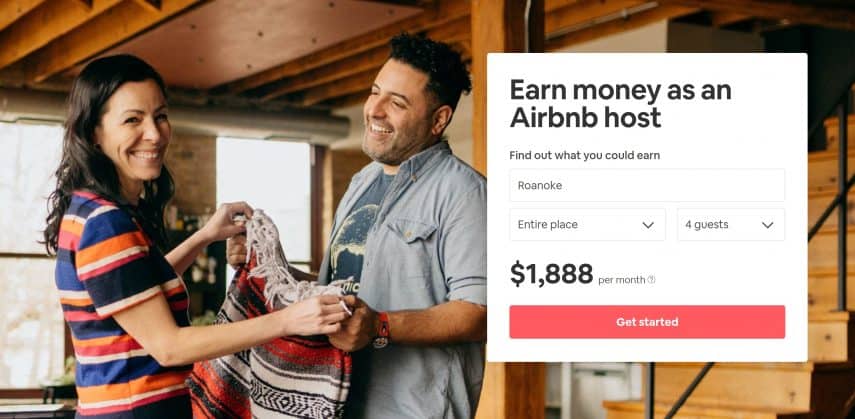
Ah, the fun part.
Why do you want to host with Airbnb? What is your goal?
Do you want to make enough money to cover your rent or mortgage, or are you just looking for a little extra spending money? Maybe you’re saving for a vacation, paying off debt, or just need some extra cash on the side to supplement your muffin and coffee addiction.
Setting goals for your money is important for the next step in the process: research. Whatever number you decide on — be it $5,000 for that vacation, or $1,500 to cover your mortgage — will help you determine how many days a month you need to rent your place in order to meet your goal.
Related: 40 Ways to Make $100 Fast When You Need Money
3. See what other local listings are priced at
Learning how to be a great Airbnb host is a little like learning how to run a business. And just like with any business, you should do a little research up front.
Take a look around the Airbnb website to check the going rate for similar rentals in your area (i.e. same number of bathrooms, bedrooms, location, etc.). Determine the average prices for weekdays and weekends.
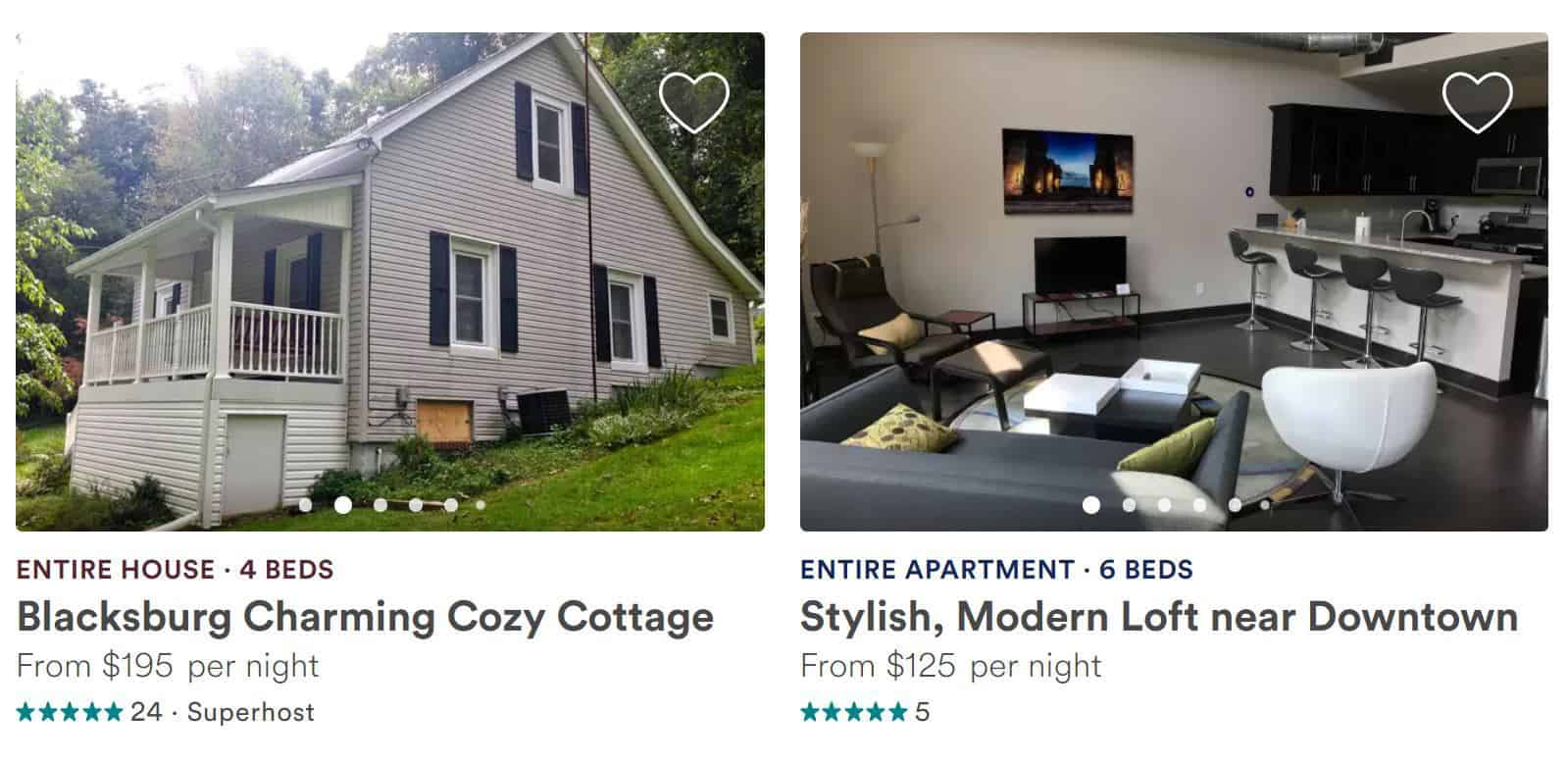
The nice thing about Airbnb is that you have the full freedom to choose when you rent out your space, and there’s no long-term commitment. Start by renting your place out just one time to get your feet wet.
Once you have a feel for how much you can expect to earn per rental, you can calculate how many nights per month you’ll need to make your place available to meet the income goal you set in Step 2.
4. Talk to your landlord
If you don’t own the place where you live, then you’ll need to ask your landlord’s permission before profiting from having strangers stay at your place. You’re more likely to get the okay if you rent from an individual rather than a large apartment complex.
Most leasing companies will not allow short-term rentals.
Furthermore, you’ll want to be prepared before you speak with whoever it is you need to get permission from. Make sure you’ve done your research, and be sure to convey to your landlord what’s in it for them.
Will you split the profit? Will the split be even or skewed?
Have some projections drawn up and be ready to discuss how much you think you can both realistically make. Your landlord is much more likely to agree if you can convince them the benefits are worth the risk.
5. Talk to your neighbors
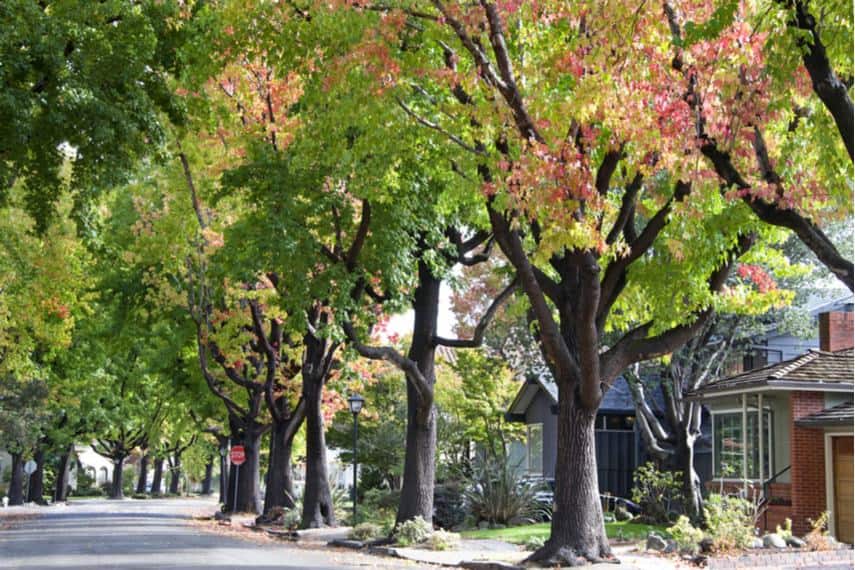
Either way, you can avoid a great deal of frustration by being up front with them about your plans.
Neighbors can put a stop to your dreams of hosting with Airbnb quickly if you or your guests behave disrespectfully. Better to get it out of the way up front to avoid potential roadblocks in the future.
Again, have a plan when you approach your neighbors and/or HOA. Let them know how often you plan to host guests, how you’ll screen potential candidates, and ask them if they have any special requests (i.e. quiet after 9 PM, maximum number of vehicles, where guests will park, etc.).
Related: A Detailed Guide to Renting Out Your Space
6. Keep insurance and taxes in mind
These are two necessary evils.
Fortunately, Airbnb has a Host Protection Insurance policy that provides liability coverage for up to $1 million for claims of bodily injury or third party property damage. This protects you from being sued by a guest who suffers some type of loss during their stay.
However, Airbnb’s policy does not protect your property; and neither will your regular homeowner’s policy.
That’s because homeowner’s policies have what’s called a “business activity” exclusion, which means your policy can deny any claim related to a business activity. What does that mean for your Airbnb business?
It means you’ll likely need to purchase a separate liability insurance policy to cover your assets.
Whether or not you need to collect occupancy taxes from your guests depends on where you live. Some locations have a collect and remit feature that automatically adds the occupancy taxes to your listing, so you don’t have to do a thing. However, if you do need to collect taxes separately, Airbnb makes it easy to do so by adding a special offer to your listing.
Tips for Maximizing Your Earnings as an Airbnb Host
If you decide to list your home (or unused room) with Airbnb, awesome.
Now it’s time to get your game face on and focus on the prize.
1. Decide what kind of host you want to be
In terms of making money, there are three main kinds of Airbnb hosts. Those who are looking for (1) ways to make money relatively quickly (2) a steady second income, or (3) want to launch a full-time Airbnb business.
Your Airbnb hustle can change and grow over time. We recommend easing into it at first, one visit at a time until you get a feeling for what it’s like to be an Airbnb host and whether or not it’s a good fit for you.
Another thing to consider is how hands-on you’ll want to be with it. Are you going to greet every visitor upon arrival or avoid human interaction at all cost (not recommended)? The more personal you make the experience, the more you can expect to earn.
This isn’t to say you won’t make money as a complete introvert, but personalizing a guest’s experience can go a long way in making them feel welcome (and more likely to open their wallet).
2. Choose your target market

What kind of guests do you want to attract?
If you’re renting a room in the house where you live, then maybe you’d prefer families or couples. But if you’re renting an independent unit (apartment, room in a detached garage, etc.) then you may not have a preference.
Now think about the type of guests you’re likely to attract.
Think about the location of your listing, attractions in your area, and the amount of space you can offer. If you plan to rent out the couch in your living room, then you’re not likely to attract many families.
Does your space have mass appeal, or is it ideal for a certain group of people? Are your guests visiting for leisure or business? Are they groups, families, or individuals? Men or women?
Knowing your target market is important for later when you actually create your listing and decide on your house rules.
Pro Tip: If you live in a college town, creating a listing during home football weekends is some of the easiest money you will ever make.
Related: 21 Inexpensive or Free Ways to Market Your Small Business
3. Be realistic about the time commitment
Hosting with Airbnb can be very hands-off if that’s your style. It can require as little or as much time as you want depending on how frequently you host, how much you want to interact with your guests, and what tasks you decide to outsource.
I’ve had hosts that I never saw my entire visit and others who were always present and even sat and chatted with me over dinner. Neither method is wrong, but you should take into account potential time spent greeting and interacting with guests, giving tours, and attending to general needs and inquiries.
If you want to keep your costs as low as possible, then you’ll also need to account for the time required to clean up after guests and to purchase and stock supplies.
4. Estimate your Airbnb hosting fees and costs
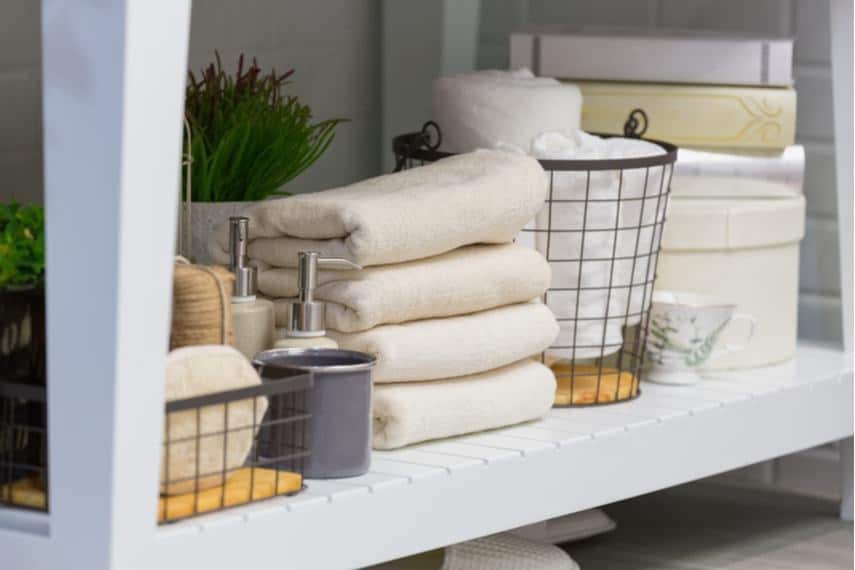
Start by determining your larger, one-time purchases, such as furniture, bath towels, insurance, etc.
Then make a checklist for supplies and perishables that will need to be restocked on a regular basis.
Calculate fees for things like:
- Toilet paper
- Paper towels
- Soap
- Shampoo and Conditioner
- Snacks and drinks
Having a checklist handy will help you determine your initial Airbnb costs and make turnover between guests much easier.
How to Create an Airbnb Listing that Sells
Now it’s time to create your listing and get your first guest!
Here are a few things to keep in mind as you put your space on the market.
1. Be honest
Don’t overstate what you have to offer, because it could come back to bite you in the form of negative reviews. Manage your guests’ expectations by being completely transparent.
If the room you’re renting is on the smaller side, then let that be known. Don’t try to up the appeal by using photos that make your space look much larger than it actually is, or else you’re setting your guests up for disappointment and your Airbnb business up for failure.
I had this happen to me once where a lady posted beautiful photos in her listing, but when I arrived the room looked completely different. I couldn’t even believe it was the same space. It was cramped, dirty, and not at all what she had led me to expect.
Don’t make her mistake.
2. Be specific
Details, details, details.
Set your listing up for success with an appealing, detailed title. Which one are you more likely to choose:
“One-Bedroom Apartment”
or
“Spacious One-Bedroom Apartment in Downtown Asheville”?
Make sure you fill out your entire profile, complete with a picture of yourself and a detailed description. Include any unique amenities you have to offer, like a complimentary breakfast or WiFi.
Remember that old saying “A picture is worth a thousand words”? Yeah, well, it’s true. Though you want to avoid misleading photos, you should include professional-looking, high-quality pictures. Make sure your space looks clean, bright, and welcoming.
If you need help with taking high quality photos for your listing, this article is super helpful.
3. Be professional with your profile
But casual at the same time.
You don’t need to sport a three piece suit in your profile picture, but you do want your profile to look clean and put together. That picture your friend took of you passed out in the bar last weekend won’t cut it unless you’re trying to attract like-minded party animals; in which case, party on.
Create your profile with your target audience/ideal guests in mind. Check for spelling and grammatical errors, and be sure to include professional-looking photographs that show off the unique personality of your space.
4. Be flexible
Remember, the people in your house are paying you to be there.
That doesn’t mean you have to oblige every request of a demanding guest, but you should be available to answer questions for them and make sure their visit goes smoothly.
It also means being flexible with check-in and check-out times. When it comes to travel, things happen. Flights are delayed, cars break down, or things just don’t go as planned. It’s important to keep an open mind (and an open schedule) if you really want to provide the best experience for your guests.
5. Set clear and simple rules
When setting rules for your guests, be explicitly clear. Don’t leave anything open for interpretation.
Are extra guests allowed? How many? What about smoking? Pets? What’s the procedure for check out?
You’ll create your house rules as part of your listing when you set up your host profile. Guests can view the rules on your listing any time, but most people won’t revisit them after they’ve booked their stay. Keep a printout in the guest space as a friendly reminder.
That said, try not to be overbearing.
Some people may find it a little off putting to walk into their room and find a list of all the things they can’t do. Add some personality, wit, or show your sense of humor.
Even a simple “Have fun! 🙂 ” to top off the list is a great touch to lighten the mood.
Success! Someone Booked Your Listing. Here’s What to Do Next.
If you’ve made it this far, go you.
Here’s what happens next.
1. Take precautions
Now, I like to think that people are generally good, but the infamous squatting Pashanin Brothers (and other people like them) do exist.
Avoid squatters by verifying the identity of your guests, checking out their Airbnb history/reviews, and only allowing short-term rentals.
Protect your valuables (guns, jewelry, technology, etc.) and any sentimental items you don’t want to lose by locking them up in a safe place.
And as a final word of caution, keep all communication and transactions with your guests on the Airbnb platform. Some under-the-table cash may sound tempting, but conducting business outside of Airbnb makes you susceptible to scams.
I’ve been using Airbnb for years and never had a problem with any of the aforementioned things; but it’s like they say — better to be safe than end up with squatters in your house.
2. Provide a welcoming (and clean) space

There’s no faster way to stack up negative reviews than by inviting guests into your dirty home. Make a good first impression by always providing a clean space. That means cleaning up after every guest.
When it comes to design, it’s best to keep it simple. A cozy, clutter-free space will make your guests feel welcome. Soft ambient lighting and relaxing music is a great way to set the mood and show the personality of your home.
Small details like fresh flowers and interesting art add a nice touch and a pleasant feeling to any space.
3. Make your guests comfortable
Having enough and the right amenities is crucial to ensuring your guests’ happiness.
Items like books, games, extra blankets, and travel-size toiletries are a huge convenience and can make all the difference in your guests’ Airbnb experience.
The first time I stayed in a really good Airbnb I was taken aback by how far the lady went out of her way to make her guests feel at home. She had locally-made soaps in the bathroom, fresh, organic eggs, snacks in a guests-only mini fridge, and extra blankets on the bed (I sleep cold, so this was huge for me).
I was even more grateful when I woke up late for a meeting my first morning there. That makeshift breakfast of fruit and granola bars kept me from being late and set my morning off on the right foot.
And you know what? It really didn’t take much extra effort on her part at all.
Put yourself in your guests’ shoes. Cater not only to their needs, but their potential needs, and it’ll pay off in your reviews.
Here’s a great example of how to make your guests feel comfortable and special:
4. Don’t avoid your guests
Be friendly, but not weird.
I stayed with a lady once who avoided me the entire time. I would hear her in the kitchen or the living room and walk downstairs to say hello (because that’s the normal person thing to do, right?) and by the time I reached the bottom of the stairs, she would have disappeared into her bedroom and locked the door.
That happened several times – in the kitchen, the living room, and once when she pulled in outside while I was leaving (she snuck through the garage to avoid me at the front door).
Avoiding your guests may seem like the right thing to do, but it can make them feel unwelcome and even uncomfortable.
You should always make an effort to meet your guest at some point during their stay, especially if you’re renting a space in your own home.
5. Go above and beyond
The higher the demand for your space, the more you can charge. The way to increase demand is to get verified reviews, and the best way to get good reviews is to please your guests.
Don’t show all your cards in your listing. When your guests arrive, have information available for local restaurants and activities that may be of interest. Offer to show them around or give them a short tour if it’s their first time visiting the area.
Ask them about their food preferences before they arrive and leave a personalized note with a treat as a welcome and “Thank you for staying.”
If a guest asks for something you don’t have on hand but would be handy, not only for them but for future guests as well, then go the extra mile and pick it up at the store if you have a chance. Small, kind gestures like this can go a long way.
If you know how to be an Airbnb host that wows their guests, you have an amazing opportunity to earn real money. By creating a wonderful experience for your guests, you’re setting yourself up for great reviews and lots of repeat guests.







